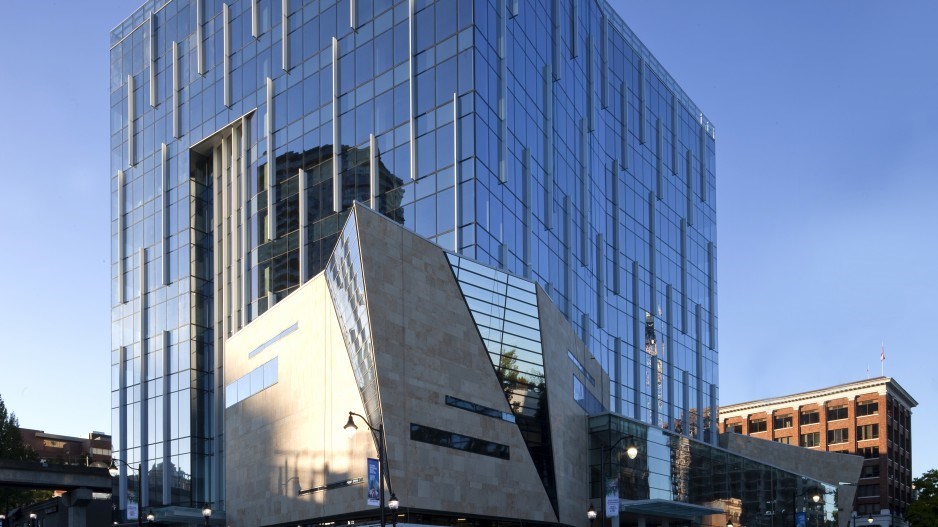Forging ahead
Cushman & Wakefield Ltd. is putting the push on New Westminster’s Anvil Centre, capitalizing on demand for strata office space with plans to sell portions of the 137,000-square-foot building.
The office portion of the complex has been slow to lease but discussions with prospective tenants pointed to fresh potential for sales. A couple of lease agreements are in progress that leave the door open to the purchase of space in the future, for example. Several recent inquiries have underscored the interest.
“We’re just saying, if there’s that much demand, let’s see if it’s there,” said Suki Sekhon, president of owner CRS Group of Companies. “We’ll probably still keep a good portion, even if we sold half of it.”
Cushman & Wakefield vice-president Roger Leggatt, who is handling sales with Max Zessel, said strata sales have been possible at Anvil Centre since CRS acquired the city-built project. However, the time seems to be ripe for a more aggressive push in this direction.
“It’s always been something that’s been there. We’re just pursuing strata on a more aggressive basis now,” Leggatt said. “We’ve seen so much demand from owner-users over the last little while.”
An owner-user has gone firm on 40,000 square feet at the Modello tower in Burnaby’s Metrotown area, for example, and last year the Canadian Office and Professional Employees Union bought 30,000 square feet in the Sovereign tower a block away.
Professionals have also underpinned demand for strata office space at Wesgroup’s Brewery District in New Westminster. A report from Colliers International and discussion at commercial real estate association NAIOP this spring suggested the potential for strata-titled highrise offices, but strata space typically enjoys a greater following among retail and industrial occupants.
However, interest has been significant for space in mid-rise office towers – a question to which Anvil Centre will hammer out the answer.
Affordability moves
The rising tide of government intervention in housing markets makes it increasingly tough to gauge the combined impact the measures will have.
On the one hand, taxes and greater scrutiny of tax filings and mortgages are coming into play to cool the market; on the other, Vancouver has pledged four sites worth $50 million for affordable housing, the province has pledged a further $500 million for projects around B.C., and Canada Mortgage and Housing Corp. (CMHC) is accepting applications for up to 4,000 units worth $200 million across the country.
But will the measures have the desired effect of making housing more affordable?
Real Estate Board of Greater Vancouver statistics last week noted that September sales dropped 32.6% from a year earlier, in line with August’s double-digit decline.
However, the benchmark house price declined just $1,200, to $931,900. That’s 29% above a year ago.
With new policies broadening the requirement for a stress test on mortgage applicants that assesses their ability to carry a mortgage at the Bank of Canada’s posted interest rate (approximately two percentage points higher than the best available mortgage rate currently on offer), it’s not getting any easier to get a mortgage.
The changes also mean lenders have fewer options for borrowers, particularly in Toronto and Vancouver.
“The Canadian consumer is ultimately going to be left with less choices,” said Paul Taylor, president and CEO of Mortgage Professionals Canada in Toronto, noting that “a sizeable minority” of borrowers could be knocked out of the market entirely.
Renters, meanwhile, face a long wait for the ambitious new government-funded units.
Vancouver has yet to rezone and approve developments on the four sites it’s chosen, while CMHC said where the 4,000 units it promises rise will depend on who applies.
“[We’re] seeking those ‘wow’ projects that might otherwise not happen,” said Lance Jakubec, a consultant assigned to CMHC’s new Innovation Fund.
Vancouver logged 2,086 purpose-built rental starts in the first eight months of this year, putting the city on track for the biggest boom in rental housing since the 1980s. Metro Vancouver logged 3,940 starts over the same period. •




